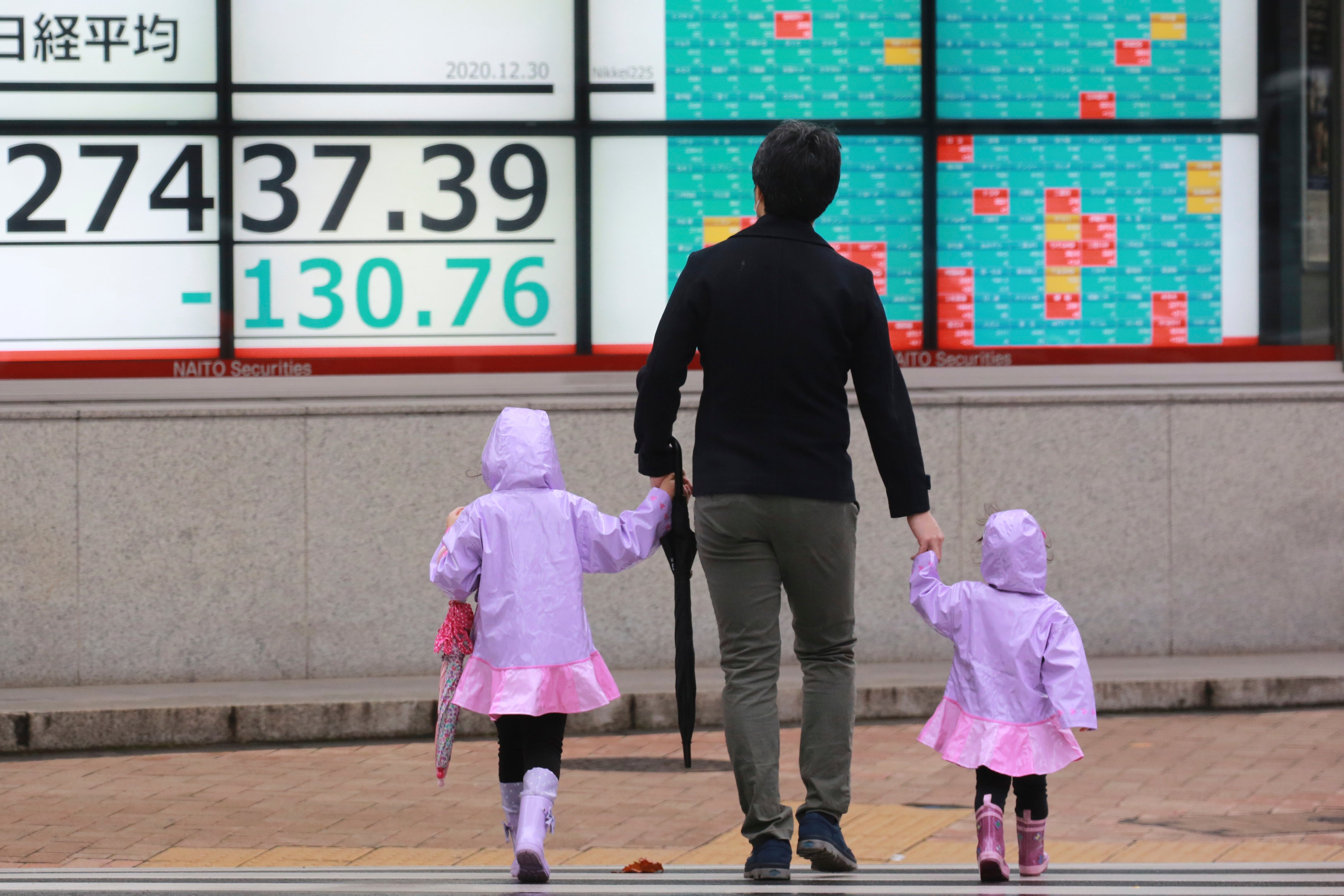Asian shares mixed as boost from US stimulus package fades
Asian shares are mixed after a lackluster day on Wall Street, as the boost from President Donald Trump's signing of the coronavirus relief package faded

Your support helps us to tell the story
From reproductive rights to climate change to Big Tech, The Independent is on the ground when the story is developing. Whether it's investigating the financials of Elon Musk's pro-Trump PAC or producing our latest documentary, 'The A Word', which shines a light on the American women fighting for reproductive rights, we know how important it is to parse out the facts from the messaging.
At such a critical moment in US history, we need reporters on the ground. Your donation allows us to keep sending journalists to speak to both sides of the story.
The Independent is trusted by Americans across the entire political spectrum. And unlike many other quality news outlets, we choose not to lock Americans out of our reporting and analysis with paywalls. We believe quality journalism should be available to everyone, paid for by those who can afford it.
Your support makes all the difference.Asian shares were mixed Wednesday after a lackluster day on Wall Street, as the boost from President Donald Trump’s signing of the coronavirus relief package faded.
Benchmarks fell in Tokyo and Sydney but rallied in Hong Kong, Seoul and Shanghai.
The S&P 500 lost 0.2% on Tuesday, a day after major indexes notched their latest all-time highs after President Donald Trump signed the $900 billion economic relief package.
An effort by Trump to get bigger, $2,000 COVID-19 relief checks for individuals has stalled in the Republican-led Senate. For now, $600 checks are set to be delivered, along with other aid, in one of the largest rescue packages of its kind.
Investors have been waiting months for such help, which economists say is needed to tide the economy over as coronavirus caseloads surge, leading governments to reimpose restrictions to stem the pandemic.
Hong Kong's Hang Seng surged 1.6% to 26,989.87, while the Shanghai Composite index advanced 1% to 3,411.44. South Korea's Kospi jumped 1.9% to 2,837.08.
Japan's Nikkei 225 fell 0.5% to 27,444.17, a day after it surged more than 2% to its highest level in more than 30 years. Japanese markets will be closed Thursday through the end of the week, reopening Jan. 4.
In Australia, the S&P/ASX 200 lost 0.3% to 6,682.40. Shares rose in Taiwan but fell in India and Southeast Asia.
“After a meteoric rise as risk dominoes toppled one by one this week, stocks fell back to earth a bit overnight," Stephen Innes of Axi said in a commentary. “And while larger stimulus paychecks would always be a welcome addition to the Q1 consumption bonanza, the current stimulus level as it sits will drive US growth sufficiently higher bridging the gap when people get vaccinated and return to those activities most impacted by COVID -19 such as dining out, travelling and other personal service-related areas."
Stocks closed modestly lower Tuesday as investors turned cautious a day after major indexes closed at their latest record highs.
The S&P 500 slipped 0.2%, in its first decline in four days as investors shifted money away from technology companies, which have been among of the biggest winners since the pandemic began.
Small-company stocks, which have been the biggest gainers this month, fell more than the rest of the market, pulling the Russell 2000 index of smaller companies 1.8% lower, to 1,959.36. It is still on track to end the month 7.7% higher, more than twice as much as the S&P 500.
The S&P 500 fell 8.32 points to 3,727.04. The Dow Jones Industrial Average dropped 0.2%, to 30,335.67. The tech-heavy Nasdaq slid 0.4%, to 12,850.22.
With two days of trading left in 2020, the S&P 500 is up 15.4% this year, while the Nasdaq is up 43.2%.
“We’re kind of seeing the same thing we've been seeing, the dichotomy between where the financial markets are and where the actual economy is,” said Charlie Ripley, senior investment strategist for Allianz Investment Management.
The recent round of aid from Washington was mostly expected and it would have taken a much bigger package to really make markets jump, he said.
Treasury yields moved higher, a sign of confidence in the economy. The yield on the 10-year Treasury rose to 0.94% from 0.93% late Tuesday.
U.S. benchmark crude oil gained 16 cents to $48.16 per barrel in electronic trading on the New York Mercantile Exchange. It picked up 38 cents to $48.00 per barrel on Tuesday. Brent crude, the international standard, added 11 cents to $51.34 per barrel.
The U.S. dollar fell to 103.34 Japanese yen from 103.54 yen. The euro rose to $1.2280 from $1.2249.